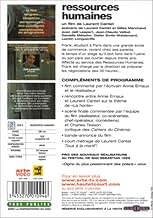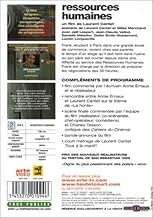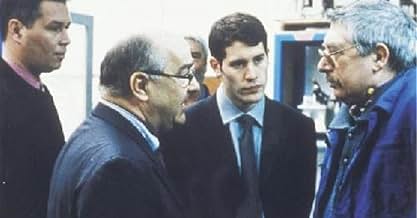CALIFICACIÓN DE IMDb
7.3/10
2.9 k
TU CALIFICACIÓN
Frank, hijo de un gerente, regresa a casa y su visión ayuda a reducir la plantilla, tensando sus lazos con su padre obrero, en el impacto de la semana laboral de 35 horas en las relaciones l... Leer todoFrank, hijo de un gerente, regresa a casa y su visión ayuda a reducir la plantilla, tensando sus lazos con su padre obrero, en el impacto de la semana laboral de 35 horas en las relaciones laborales.Frank, hijo de un gerente, regresa a casa y su visión ayuda a reducir la plantilla, tensando sus lazos con su padre obrero, en el impacto de la semana laboral de 35 horas en las relaciones laborales.
- Dirección
- Guionistas
- Elenco
- Premios
- 19 premios ganados y 5 nominaciones en total
Didier Woldemard
- Alain
- (as Didier Emile-Woldemard)
- Dirección
- Guionistas
- Todo el elenco y el equipo
- Producción, taquilla y más en IMDbPro
Opiniones destacadas
10suee13
This is a well-made, powerful film addressing the dynamic between union factory workers and management in a suburban French factory. The director makes use of many non-actors, like the union rep (who is a union rep in real life) which lends the film an almost documentary-like feel. I thought the acting was extremely real and powerful and this potentially boring subject matter kept me captivated to the end. I highly recommend this film.
This was a positive surprise... I didn't have a clue what to expect when I rented Ressources Humaines, but it turned out to be a great film with fine performances from the cast (especially Jalil Lespert and Jean-Claude Vallod).
First, the premise is very interesting. What happen with the family dynamics when the sons and daughters are more educated than their parents? Of course, that is only one aspect of this film's premise. Second, the scene where Franck is yelling at, and blaming, his father is absolutely heartrending. Only a stone wouldn't react to that masterful scene. Third, "entertaining" is hardly the word to describe Ressources Humaines, but I have to say that this film seemed much shorter than tired comedies like Charlie's Angels and Scary Movie.
(8/10) Highly recommended.
First, the premise is very interesting. What happen with the family dynamics when the sons and daughters are more educated than their parents? Of course, that is only one aspect of this film's premise. Second, the scene where Franck is yelling at, and blaming, his father is absolutely heartrending. Only a stone wouldn't react to that masterful scene. Third, "entertaining" is hardly the word to describe Ressources Humaines, but I have to say that this film seemed much shorter than tired comedies like Charlie's Angels and Scary Movie.
(8/10) Highly recommended.
Although the context for this film is the political tension surrounding the introduction of the 35 working week, the soul of the film lies in the relationship between father and son and its power to evoke folk memories of other, epic, generational struggles.This power comes not so much from what is said but from what is NOT said - looks, gestures, silences.This makes it sound as though the film is ponderous but it isn't: the context makes sure that there's plenty of action and there is a lightness of touch in the family scenes.The two struggles ( familial and political)are perfectly intertwined with each adding meaning to the other.The Human Resources of the title therefore refers not just the rather inhuman term for personnel management - but also to the resources which father and son find within themselves to cope with their respective situations.
There is a naturalness about the location, the setting and the pace that makes this film a refreshing change from Hollywood High Tech. It is well worth seeing.
There is a naturalness about the location, the setting and the pace that makes this film a refreshing change from Hollywood High Tech. It is well worth seeing.
An excellent movie, a must for everyone interested in sociology, management or leadership. Terrific acting, partly by amateurs playing themselves, and a setting as realistic as your factory next door. For pessimistic people maybe a bit too depressing...
"You're not fired. You can stay. You're too young, too cheap to be unprofitable." -- Franck Verdeau
Laurent Cantet's first film, Human Resources, shows the dehumanizing effect of mechanical labor on the relationship between a father and his son in rural France. The film has a strong political message but never feels sterile or preachy; rather it is a deeply felt human drama about class mobility. Jalil Lespert, the only professional actor in the cast, is Franck Verdeau, a young, handsome intern who works for the same company in which his father (Jean-Claude Vallod) has toiled for thirty years. Mr. Verdeau is a heavy-set taciturn individual who operates an automatic welding device that forces him to stand on his feet all day, bent over his machine and proudly claims that he can churn out 700 parts per hour. A member of the old school who does not believe in upsetting the bosses, the father is more compliant than most workers who still operate within the system but express their misgivings in union activity.
Franck has just returned home from school in Paris. Eager to seize upon the opportunity presented to him through his father's sacrifice, he seeks to impress management and launch his career by assessing the validity of instituting a 35-hour workweek. Although he has made a good first impression on his shrewd boss (Lucien Longueville), he soon comes into conflict with union leaders who are fearful that reducing the amount of hours will lead to automation and loss of jobs. Torn between his professional obligations and his sympathies for the workers, Franck naively proposes a referendum of the workers on the issue. This plays into the hands of management seeking to drive a wedge between the workers and their union, led by firebrand activist, Danielle Arnoux (Danielle Melador).
Arnoux, a real-life left-wing union activist, is an aggressive and uncompromising leader who does not hesitate to let management know exactly where she stands. When more layoffs seem to be forecast including that of his own father, Franck must choose sides between the militants and the father who made his job and career possible. Mr. Verdeau is opposed to the union and cannot see any benefit from a staggered workweek that would mean increased leisure. Their final confrontation about the father's passivity brings to the surface resentments about his father's social class that have been repressed for many years.
Human Resources is shot inside an actual factory, creating an authenticity furthered by its cast of actual factory employees. I found myself deeply involved with the characters. In tackling an issue that Hollywood has stayed miles away from, Cantet has made us aware of the daily drudgery of millions of people around the world for whom compromise and submission is a way of life. The film never loses his focus, striking a balance between social relevance and a character study of deeply conflicted individuals whose work is reflected in their self-image. Cantet said in an interview, "The title Human Resources is a reaction against the cynicism of that expression. A human being is administered the same way you would administer stocks or capital. I wanted to play on that double meaning and go beyond coded administrative lingo in order to talk about an actual human's resources." He has succeeded impressively.
Laurent Cantet's first film, Human Resources, shows the dehumanizing effect of mechanical labor on the relationship between a father and his son in rural France. The film has a strong political message but never feels sterile or preachy; rather it is a deeply felt human drama about class mobility. Jalil Lespert, the only professional actor in the cast, is Franck Verdeau, a young, handsome intern who works for the same company in which his father (Jean-Claude Vallod) has toiled for thirty years. Mr. Verdeau is a heavy-set taciturn individual who operates an automatic welding device that forces him to stand on his feet all day, bent over his machine and proudly claims that he can churn out 700 parts per hour. A member of the old school who does not believe in upsetting the bosses, the father is more compliant than most workers who still operate within the system but express their misgivings in union activity.
Franck has just returned home from school in Paris. Eager to seize upon the opportunity presented to him through his father's sacrifice, he seeks to impress management and launch his career by assessing the validity of instituting a 35-hour workweek. Although he has made a good first impression on his shrewd boss (Lucien Longueville), he soon comes into conflict with union leaders who are fearful that reducing the amount of hours will lead to automation and loss of jobs. Torn between his professional obligations and his sympathies for the workers, Franck naively proposes a referendum of the workers on the issue. This plays into the hands of management seeking to drive a wedge between the workers and their union, led by firebrand activist, Danielle Arnoux (Danielle Melador).
Arnoux, a real-life left-wing union activist, is an aggressive and uncompromising leader who does not hesitate to let management know exactly where she stands. When more layoffs seem to be forecast including that of his own father, Franck must choose sides between the militants and the father who made his job and career possible. Mr. Verdeau is opposed to the union and cannot see any benefit from a staggered workweek that would mean increased leisure. Their final confrontation about the father's passivity brings to the surface resentments about his father's social class that have been repressed for many years.
Human Resources is shot inside an actual factory, creating an authenticity furthered by its cast of actual factory employees. I found myself deeply involved with the characters. In tackling an issue that Hollywood has stayed miles away from, Cantet has made us aware of the daily drudgery of millions of people around the world for whom compromise and submission is a way of life. The film never loses his focus, striking a balance between social relevance and a character study of deeply conflicted individuals whose work is reflected in their self-image. Cantet said in an interview, "The title Human Resources is a reaction against the cynicism of that expression. A human being is administered the same way you would administer stocks or capital. I wanted to play on that double meaning and go beyond coded administrative lingo in order to talk about an actual human's resources." He has succeeded impressively.
¿Sabías que…?
- TriviaSame script structure as Oliver Stone's "Wall Street".
- Bandas sonorasQuatuor N°13 en la mineur
Composed by Franz Schubert
Performed by Melos Quartett (as Melos Quartet)
Published by Harmonia Mundi
Selecciones populares
Inicia sesión para calificar y agrega a la lista de videos para obtener recomendaciones personalizadas
Detalles
- Fecha de lanzamiento
- Países de origen
- Sitio oficial
- Idioma
- También se conoce como
- Human Resources
- Locaciones de filmación
- Productoras
- Ver más créditos de la compañía en IMDbPro
Taquilla
- Total en EE. UU. y Canadá
- USD 116,866
- Fin de semana de estreno en EE. UU. y Canadá
- USD 29,526
- 17 sep 2000
Contribuir a esta página
Sugiere una edición o agrega el contenido que falta

Principales brechas de datos
What is the English language plot outline for Ressources humaines (1999)?
Responda





















